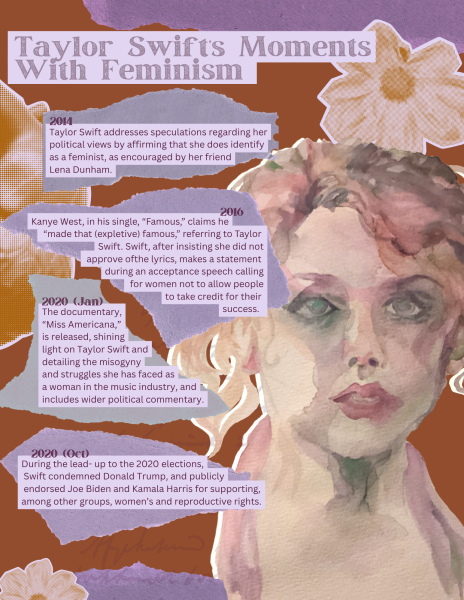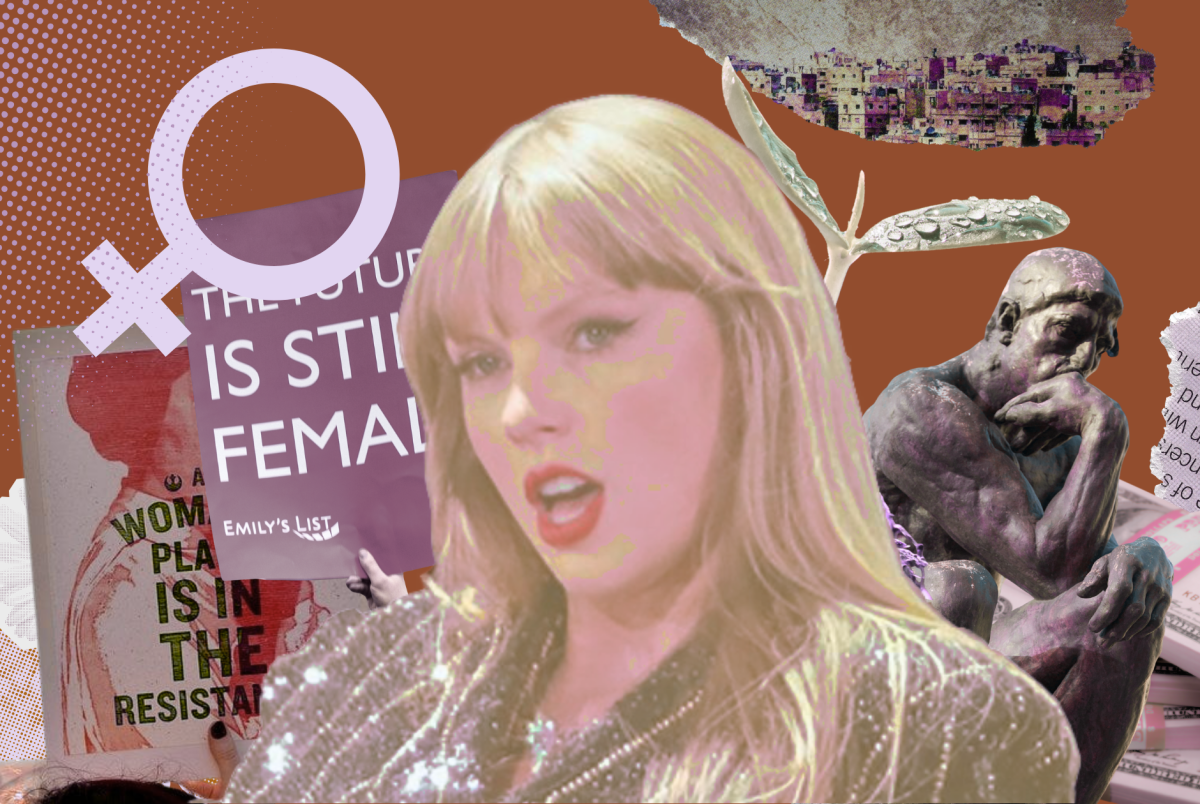Taylor Swift has just released her newest album, “The Life of a Showgirl,” to intense anticipation. The past several years of Swift’s career, with the release of three albums in the past three years, and the massively successful Eras Tour, have marked her a comfortable place in history.
Swift is one of the largest celebrities today, both because of her art and because of what she represents to young women. Swift makes music that centers a female perspective, and is widely beloved for her ability to connect to female experiences. Since declaring herself a feminist in 2014, she has adopted a progressive political stance, advocating for BLM, LGBTQ+, and reproductive rights, urging her fans to register to vote, and speaking out against Donald Trump during presidential elections.
“As a teenager, I didn’t understand that saying you’re a feminist is just saying that you hope women and men will have equal rights and equal opportunities,” Swift said in 2014. “What it seemed to me was that you hate men. For so long it’s been made to seem like something where you’d picket against the opposite sex, whereas it’s not about that at all.”
As with all things that teenage girls and young women enjoy, Taylor Swift’s unapologetic pop music is subjected to harsher criticism than male artists of the same popularity. The cultural phenomenon of devaluing art and media that is popular with young women has ironically spurred Swift’s image further into success, out of spite for the bad-faith criticism of her work.
Additionally, as a woman in a position of power, Swift has been subjected to unfair criticisms rooted in misogyny, the hypocrisy of which she pointed out in her 2019 song, “The Man.” However, the song is representative of a particular trend amidst Swift’s feminist activism.
Taylor Swift’s feminism overwhelmingly supports and centers women in similar positions to her. “The Man” is about a woman who has achieved a great deal of success but experiences greater backlash than men in similar circumstances. While the song makes a valid point about female success, underlying it is Swift’s tendency towards calling out only the individual instances of misogyny leveraged against privileged women.
 “The Man” describes how successful women are discouraged from the same traits of aggression or promiscuousness that successful men are encouraged to have. Swift implies that women should be allowed to be “bosses” too. But why do we associate these traits with success? It is because they are associated with masculinity to begin with; in aspiring to be allowed to be “an alpha type,” the song essentially perpetuates the idea that women will be equal when they are allowed to be stereotypically masculine, when equality is more likely to be reached when we no longer associate stereotypically feminine traits with failure.
“The Man” describes how successful women are discouraged from the same traits of aggression or promiscuousness that successful men are encouraged to have. Swift implies that women should be allowed to be “bosses” too. But why do we associate these traits with success? It is because they are associated with masculinity to begin with; in aspiring to be allowed to be “an alpha type,” the song essentially perpetuates the idea that women will be equal when they are allowed to be stereotypically masculine, when equality is more likely to be reached when we no longer associate stereotypically feminine traits with failure.
In 2014, Nicki Minaj made several tweets criticizing the MTV VMAs, saying that they disproportionately celebrate “women with very slim bodies.” Swift, who had been nominated, replied as if Minaj had called her out specifically. Minaj went on to explain how her criticism was specifically about how the music industry treats Black women and women of different body types unfairly, and that she was not posting about the individuals nominated.
Although this instance was considered “unserious Twitter beef,” it is an instance of Taylor Swift’s surface-level feminism. Swift is a feminist, and this is an undoubtedly good thing, but her feminism could be taken so much further.
However, Taylor Swift is not uniquely terrible in this vein; rather, she is a product of a wider culture that rewards this lackluster level of activism.
White women tend to have a knee-jerk reaction to the term “white feminism,” as it posits their privilege before their identity as women. However, criticism of white feminism, as a concept, is less an accusation that white women cannot be oppressed, but rather that their blindness to the unique ways that misogyny affects non-caucasian and other minority women stalls the full potential of their movement. Mikki Kendall, in the book “Hood Feminism,” parsed the issue of white feminism as lacking intersectionality, which in turn has weakened the overall goal of feminism.
“Instead of a framework that focuses on helping women get basic needs met, all too often the focus [of white feminism] is not on survival, but on increasing privilege,” Kendall writes. “For a movement that is meant to represent all women, it often centers on those who already have most of their needs met.”
We belong to a political landscape that values the optics of social progressivism more than it engages with true progress. When somebody in a position of power makes a post in solidarity with a minority group (potentially even donating to a charity!), we praise them and mentally tick them off as “a good person.” Past that point, we expect little more from them.
Thus, white feminism emerges as a dominating strand of feminism, one which gives off a good impression, allowing the person participating and their followers to be satisfied that they are good people, despite not making significant cultural commentary or change.
Taylor Swift engages in a typical cyclical narrative perpetuated by white feminism, experiencing, as a woman, the outcome of an oppressive system (e.g. being harassed, mistreated in the workplace, etc.), proving to overcome such a difficulty, saying a few words about how it is unfair that women experience this, but in the end not criticising the underlying structures at play or wondering how we got here.
“[Previous feminists] are concerned about equal rights, but tend to think the genders have achieved parity or that society is well on its way to delivering it to them,” an article from Pacific Magazine about the four waves of feminism reads. “Feminism is part of a larger consciousness of oppression along with racism, ageism, classism, abelism, and sexual orientation. Feminism no longer just refers to the struggles of women; it is a clarion call for gender equity.”
There is a strong foundation for feminism that promotes more than looking pretty to a socially conscious fanbase, which has primarily been constructed by queer women and women of colour, and yet we don’t utilize it because it is not talked about.
It is crucial that we, as non-celebrities, begin to expect a higher quality of “speaking out” from people in positions of power who benefit from the publicity of being politically aware.
Taylor Swift is currently one of the most well-known celebrities in the entire world, with one of the largest social platforms. Of course, she is just one woman who is not obliged to bring about the revolution; nevertheless, she is incredibly privileged, more than nearly any other activist today. If Taylor Swift were to ask that we destructure the patriarchy, then by God it would be done. But she needs to bring it about, first.




